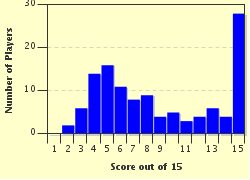Quiz Answer Key and Fun Facts
1. Where is the birthplace of Charles de Gaulle?
2. What is Charles de Gaulle's full name?
3. What profession did Charles de Gaulle follow, prior to embarking on a military career?
4. Charles de Gaulle was captured by German troops during World War I, and spent most of the war in captivity.
5. Charles de Gaulle remained in the army after World War I, and served with distinction in which of these countries?
6. Which of these statements concerning Charles de Gaulle's family life is true?
7. Throughout his military and political careers, Charles de Gaulle was given a variety of nicknames by both friends and foes.
Which of these is NOT one of his nicknames?
8. What military rank did Charles de Gaulle hold when France was invaded in 1940?
9. Charles de Gaulle held a senior post in the French government prior to the surrender to Germany in World War II.
10. The Casablanca Conference, to agree Allied strategy in Europe, was held in 1943. Which of these national leaders attended the conference?
11. "Of all the crosses I have had to bear during this war, the heaviest has been the Cross of Lorraine" was said of General de Gaulle during World War II.
Who actually said these words?
12. Operation Overlord, the Allied invasion of Normandy, took place under the overall command of General Dwight D. Eisenhower on June 6th, 1944.
How soon after this invasion did General de Gaulle return to France?
13. Following his triumphal return to France, General de Gaulle formed a government of national unity in September 1944, but resigned just over a year later in January 1946.
What was the main reason for his resignation from the government he'd been so pro-active in forming?
14. Charles de Gaulle died on 9th November, 1970, two weeks before his eightieth birthday. How many heads of state attended his funeral?
15. In many countries there are streets or squares named after Charles de Gaulle. There are also various other things named after him, but which of the following is NOT one of these?
Source: Author
picqero
This quiz was reviewed by FunTrivia editor
bloomsby before going online.
Any errors found in FunTrivia content are routinely corrected through our feedback system.

